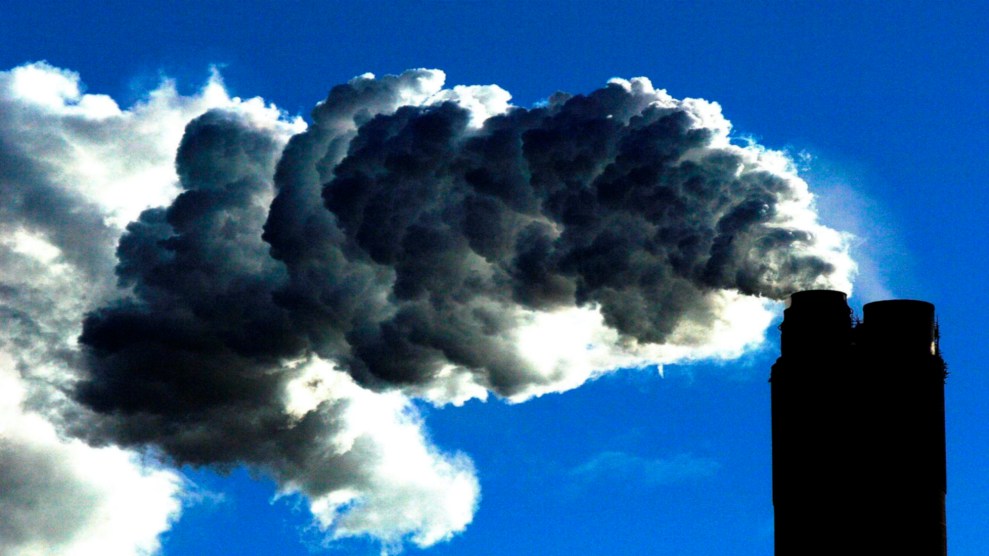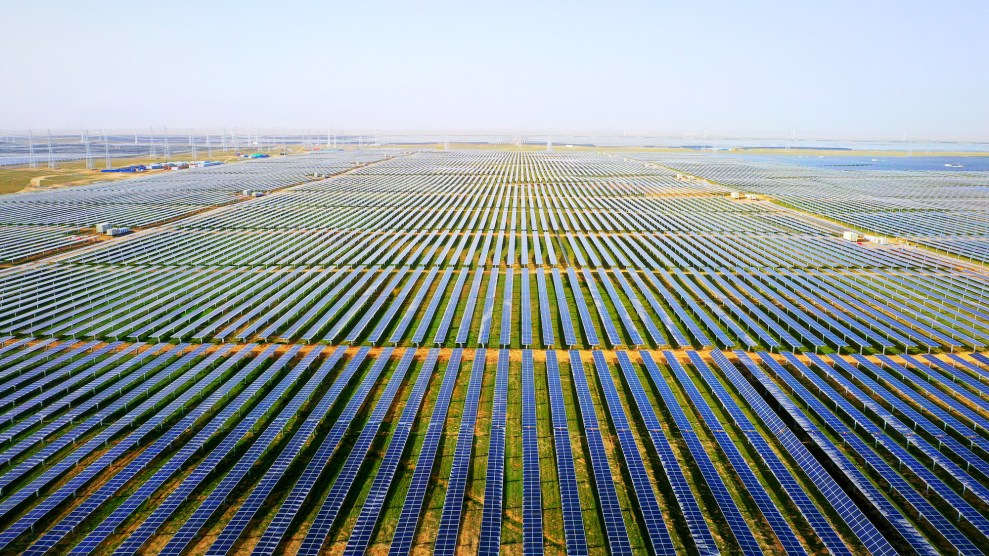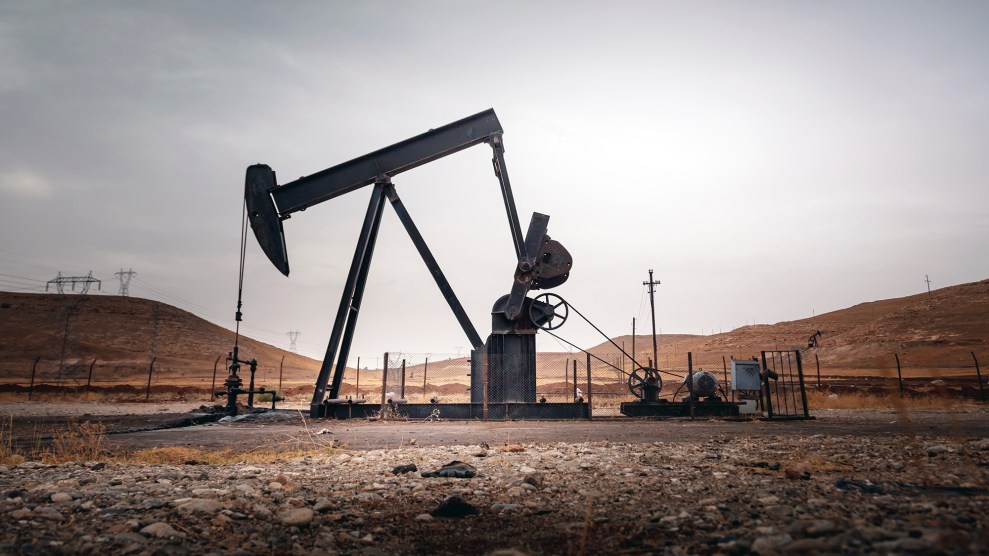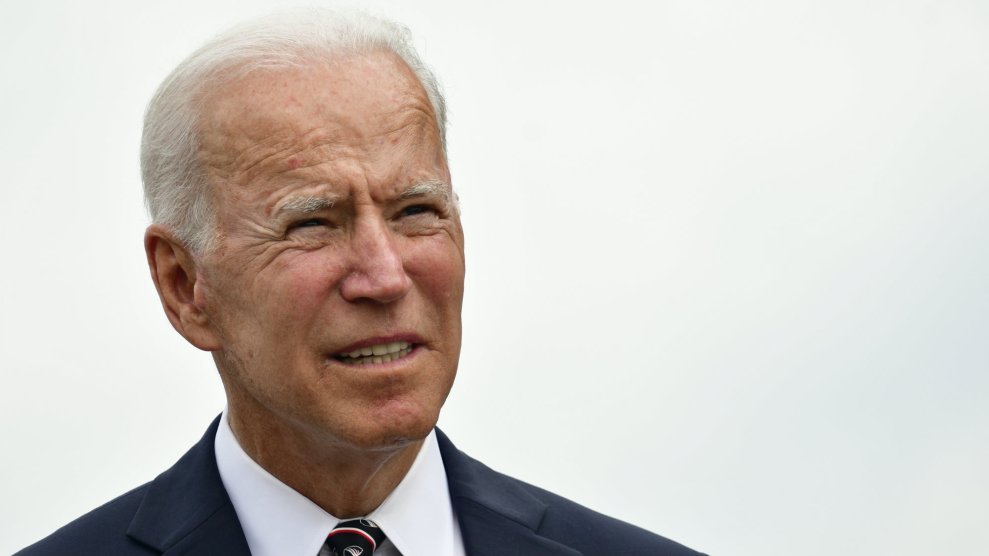
Smoke from the Eggborough Power Station, a coal fired plant near Selby, which has since been decommissioned. Global carbon emissions from using fossil fuels fell by a record amount in 2020 as a result of Covid-19 lockdowns around the world, researchers have said. (John Giles/AP)
This story was originally published by The Guardian and is reproduced here as part of the Climate Desk collaboration.
No one who was in the hall that winter evening in a gloomy conference centre on the outskirts of the French capital will ever forget it. Tension had been building throughout the afternoon, as after two weeks of fraught talks the expected resolution was delayed and then delayed yet again. Rumours swirled—had the French got it wrong? Was another climate failure approaching, the latest botched attempt at solving the world’s global heating crisis?
Finally, as the mood in the hall was growing twitchy, the UN security guards cleared the platform and the top officials of the landmark Paris climate talks took to the podium. For two weeks, 196 countries had huddled in countless meetings, wrangling over dense pages of text, scrutinising every semicolon. And they had finally reached agreement. Laurent Fabius, the French foreign minister in charge of the gruelling talks, looking exhausted but delighted, reached for his gavel and brought it down with a resounding crack. The Paris agreement was approved at last.
Nicholas Stern, the climate economist, found himself hugging Xia Zhenhua, the normally reserved Chinese minister, while whoops and shouts echoed round the hall. “I felt that the Paris agreement was the moment when the world decided it really had to manage climate change in a serious way,” he said. “We were all in it together, that’s what people realized.”
At Paris, for the first time rich and poor countries joined together in a legally binding treaty pledging to hold global heating to heating well below 2C, the scientifically-advised limit of safety, with an aspiration not to breach 1.5C above pre-industrial levels. Those two weeks of tense talks in the French capital were the climax of 25 years of tortuous negotiations on the climate, since governments were warned of the dangers of climate chaos in 1990. The failure, discord and recriminations of those decades were left behind as delegates from 196 countries hugged, wept and cheered in Paris.
Todd Stern, climate envoy to President Barack Obama, recalls: “My team and I had been working toward this for seven years … and the story of climate negotiations had so often been one of disappointment. And yet here we were and we knew that we had—all together—done a really big thing. A very special moment. An unforgettable one.”
The accord itself has proved remarkably resilient. Bringing together 196 nations in 2015 was not easy—even as Fabius brought down the gavel on the agreement, there was a little chicanery as Nicaragua had planned to object to the required consensus, but was ignored. Yet that consensus has remained robust. When the US—the world’s biggest economy and second biggest emitter—began the process of withdrawal from Paris, under President Donald Trump in 2017, a disaster might have been expected. The Kyoto 1997 protocol fell apart after the US signed but failed to ratify the agreement, leaving climate negotiations in limbo for a decade.
If Trump was hoping to wreck Paris, he was disappointed: the rest of the world shrugged and carried on. There was no exodus of other countries, although some did pursue more aggressive tactics at the annual UN talks. The key axis of China and the EU remained intact, deliberately underlined by China’s President Xi Jinping when he chose to surprise the world with a net zero emissions target at the UN general assembly in September, just as the UN election race was hotting up.
Remy Rioux, one of the French government team who led the talks, now chief executive of the French Development Agency, said: “The Paris agreement has proven to be inclusive and at scale, with the participation of countries representing 97% of global emissions, as well as that of non-state actors such as businesses, local government and financial institutions—and very resilient, precisely because it is inclusive. The Paris agreement is a powerful signal of hope in the face of the climate emergency.”
On some measures, Paris could be judged a failure. Emissions in 2015 were about 50 bn tons. By 2019, they had risen to about 55bn tons, according to the UN Environment Program (UNEP). Carbon output fell dramatically, by about 17% overall and far more in some regions, in this spring’s coronavirus lockdowns, but the plunge also revealed an uncomfortable truth: even when transport, industry and commerce grind to a halt, the majority of emissions remain intact. Far greater systemic change is needed, particularly in energy generation around the world, to meet the Paris goals.
Ban Ki-moon, former UN secretary-general, told the Guardian: “We have lost a lot of time. Five years after the agreement in Paris was adopted with huge expectations and commitment by world leaders, we have not done enough.”
What’s more, we are still digging up and burning fossil fuels at a frantic rate. UNEP reported last week that production of fossil fuels is planned to increase by 2% a year. Meanwhile, we continue to destroy the world’s carbon sinks, by cutting down forests—the world is still losing an area of forest the size of the UK each year, despite commitments to stop deforestation—as well as drying out peatlands and wetlands, and reducing the ocean’s capacity to absorb carbon from the air.
Global temperatures have already risen by more than 1C above pre-industrial levels, and the results in extreme weather are evident around the world. Wildfires raged across Australia and the US this year, more than 30 hurricanes struck, heatwaves blasted Siberia, and the Arctic ice is melting faster.
António Guterres, secretary-general of the UN, put it in stark terms: “Humanity is waging war on nature. This is suicidal. Nature always strikes back—and it is already doing so with growing force and fury. Biodiversity is collapsing. One million species are at risk of extinction. Ecosystems are disappearing before our eyes.”
But to judge Paris solely by these portents of disaster would be to lose sight of the remarkable progress that has been made on climate change since. This year, renewable energy will make up about 90% of the new energy generation capacity installed around the world, according to the International Energy Agency, and by 2025 will be the biggest source of power, displacing coal. That massive increase reflects rapid falls in the price of wind turbines and solar panels, which are now competitive or cheaper than fossil fuel generation in many countries, even without subsidy.
“We never expected to see prices come down so fast,” said Adair Turner, chair of the Energy Transitions Commission and former chief of the UK’s committee on climate change. “We have done better than the most optimistic forecasts.”
Oil prices plunged this spring as coronavirus lockdowns grounded planes and swept cities free of cars, and some analysts predict that the oil business will never recover its old hegemony. Some oil companies, including BP and Shell, now plan to become carbon-neutral.
Electric vehicles have also improved much faster than expected, reflected in the stunning share price rise of Tesla. The rise of low-carbon technology has meant that when the Covid-19 crisis struck, leading figures quickly called for a green recovery, and set out plans for ensuring the world “builds back better”.
Most importantly, the world has coalesced around a new target, based on the Paris goals but not explicit in the accord: net zero emissions. In the last two years, first a trickle and now a flood of countries have come forward with long-term goals to reduce their greenhouse gas emissions to a fraction of their current amount, to the point where they are equal to or outweighed by carbon sinks, such as forests.
The UK, EU member states, Norway, Chile and a host of developing nations led the way in adopting net zero targets. In September, China’s president surprised the world by announcing his country would achieve net zero emissions in 2060. Japan and South Korea quickly followed suit. US president-elect Joe Biden has also pledged to adopt a target of net zero emissions by 2050. That puts more than two thirds of the global economy under pledges to reach net zero carbon around mid-century.
If all of these countries meet their targets, the world will be almost on track to meet the upper limit of the Paris agreement. Climate Action Tracker, which analyses carbon data, has calculated that the current pledges would lead to a temperature rise of 2.1C, bringing the world within “striking distance” of fulfilling the 2015 promise.
Niklas Hohne of NewClimate Institute, one of the partner organisations behind Climate Action Tracker, said: “Five years on, it’s clear the Paris agreement is driving climate action. Now we’re seeing a wave of countries signing up [to net zero emissions]. Can anyone really afford to miss catching this wave?”
The key issue, though, is whether countries will meet these long-term targets. Making promises for 2050 is one thing, but major policy changes are needed now to shift national economies on to a low-carbon footing. “None of these [net zero] targets will be meaningful without very aggressive action in this decade of the 2020s,” said Todd Stern. “I think there is growing, but not yet broad enough, understanding of that reality.”
Renewing the shorter term commitments in the Paris agreement will be key. As well as the overarching and legally binding limit of 1.5C or 2C, governments submitted non-binding national plans at Paris to reduce their emissions, or to curb the projected rise in their emissions, in the case of smaller developing countries. The first round of those national plans – called nationally determined contributions – in 2015 were inadequate, however, and would lead to a disastrous 3C of heating.
The accord also contained a ratchet mechanism, by which countries must submit new national plans every five years, to bring them in line with the long-term goal, and the first deadline is now looming on 31 December. UN climate talks were supposed to take place this November in Glasgow, but had to be postponed because of the pandemic. The UK will host the COP26 summit next November instead, and that will be the crucial meeting.
The signs for that decisive moment are good, according to Laurent Fabius. The election of Biden in the US means it will be aligned with the EU and China in pushing for net zero emissions to be fully implemented. “We shall have the conjunction of the planets which made possible the Paris agreement,” Fabius told the Guardian. “Civil society, politics, business all came together for the Paris agreement. We are looking at the same conjunction of the planets now with the US, the EU, China, Japan—if the big ones are going in the right direction, there will be a very strong incentive for all countries to go in the right direction.”
As host of the COP26 talks, the UK is redoubling its diplomatic efforts towards next year’s conference. The French government brought all of its diplomatic might to bear on Paris, instructing its ambassadors in every country to make climate change their top priority, and sending out ministers around the globe to drum up support.
Laurence Tubiana, France’s top diplomat at the talks, said another key innovation was what she termed “360 degree diplomacy”. That means not just working through the standard government channels, with ministerial meetings and chats among officials, but reaching out far beyond, making businesses, local government and city mayors, civil society, academics and citizens part of the talks.
“That was a very important part of [the success] of Paris,” she said. The UK has taken up a similar stance, with a civil society forum to ensure people’s voices are heard, and a specially convened council of young people advising the UN secretary-general. The UK’s high-level champion, Nigel Topping, is also coordinating a “race to zero” by which companies, and non-state actors such as cities, states and sub-national governments are also committing to reach net zero emissions.
One massive issue outstanding ahead of COP26 is finance. Bringing developing countries, which have suffered the brunt of a problem that they did little to cause, into the Paris agreement was essential. Key to that, said Fabius, was the pledge of financial assistance The French government had to reassure poorer nations at the talks that $100bn a year in financial assistance, for poor countries to cut their emissions and cope with the impacts of the climate crisis, would be forthcoming. “Money, money, money,” Fabius insisted, was at the heart of the talks. “If you don’t have that $100bn [the talks will fail].”
For the UK as hosts of COP26, the question of money presents more of a problem since the chancellor, Rishi Sunak, swung his axe at the overseas aid budget in the recent spending review. Although the £11bn designated for climate aid will be ringfenced, persuading other developed countries to part with cash—and showing developing countries that the UK is on their side—has suddenly become more difficult. Amber Rudd, the former UK energy and climate minister who represented the UK at the Paris talks, said: “A country that understood the seriousness of COP26 would not be cutting international aid right now.”
Alok Sharma, president of COP26 and the UK’s business secretary, will draw on his experience as the UK’s former international development minister in dealing with developing countries’ expectations. He said: “I completely recognise making sure we have the finance for climate change action is very important. That’s why we have protected international climate finance. I think people understand we are in a difficult economic situation. We have said when the economy recovers we would look to restore [overseas aid as 0.7% of GDP]. I do think when it comes to climate change we are putting our best foot forward.”
Boris Johnson will be hoping to smooth over these tricky issues when he, alongside the French government and the UN, presides over a virtual meeting of world leaders this weekend, on 12 December, the fifth anniversary of the Paris accord. At least 70 world leaders are expected to attend, and they will be pushed to bring forward new NDCs and other policy commitments, as a staging post toward the COP26 summit.
Johnson kicked off preparations for the meeting last Friday by announcing the UK’s own NDC, setting out a 68% cut in emissions compared with 1990 levels, by 2030. That would put the UK ahead of other developed economies, cutting emissions further and faster than any G20 country has yet committed to do.
Critics pointed out, however, that the UK is not on track to meet its own current climate targets, for 2023. Far more detailed policy measures are likely to be required, some of them involving major changes and economic losers as well as winners, before the path to net zero is clear.
The world is facing the task of a global economic reboot after the ravages of the coronavirus pandemic. The green recovery from that crisis is itself in need of rescue, Guardian analysis has shown, as countries are still pouring money into fossil fuel bailouts. But with so many countries now committed to net zero emissions, and an increasing number coming forward with short term targets for 2030 to set us on that path, there are still grounds for optimism. This week’s climate ambition summit will be an important milestone, but the COP26 summit next year will be the key test. The Paris agreement five years on still provides the best hope of avoiding the worst ravages of climate breakdown: the question is whether countries are prepared to back it up with action, rather than more hot air.
















